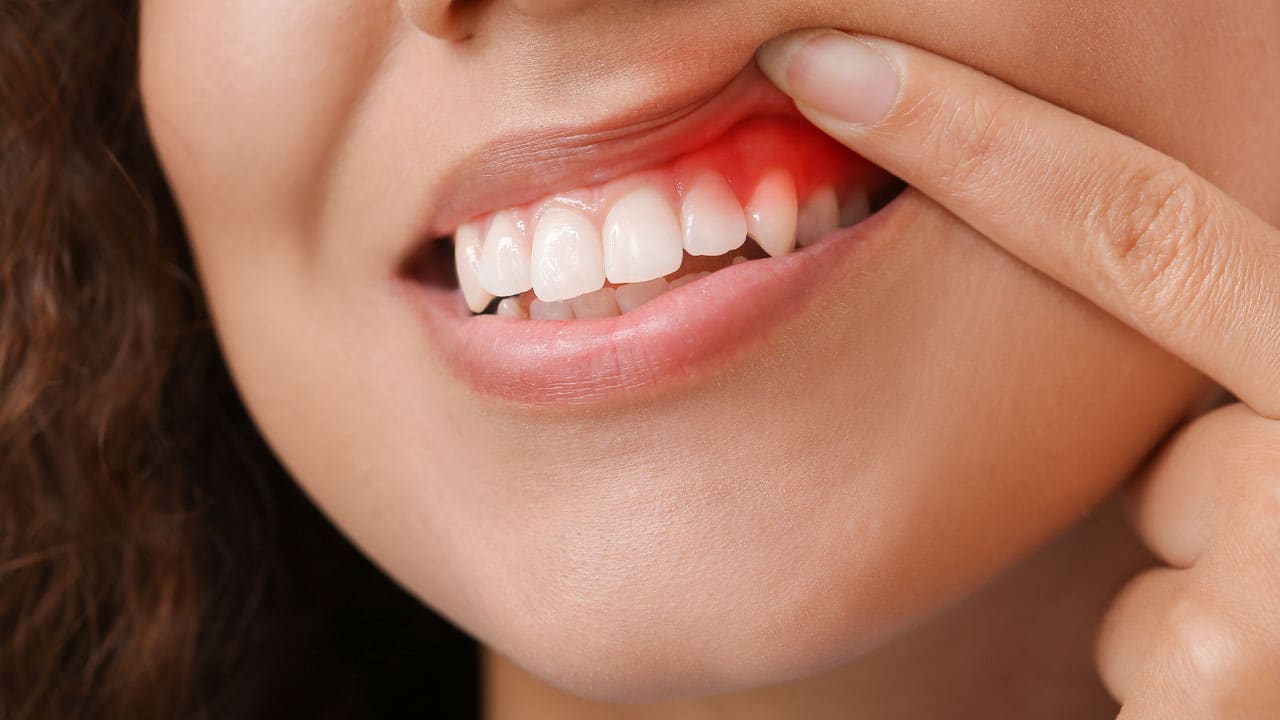
Gum disease is a progressive condition caused by plaque buildup along the gum line. This buildup leads to inflammation and infection. Almost half of the adults over 30 show signs of gum disease, with nearly 10% suffering from severe gum disease. Fortunately, gum disease can be treated and reversed in the early stages.
Stages of Gum Disease
Several stages of gum disease have differing symptoms. It is crucial to identify which stage you are at to discuss the appropriate treatment options with your dentist.
Stage One: Gingivitis
The first and mildest stage of gum disease is gingivitis (inflammation of the gums.) Inflammation characteristic of gum disease is caused by tartar, a hardened calculus that irritates the gum tissue.
When substandard oral hygiene leads to plaque buildup, the gums become inflamed, which loosens their attachment to the teeth and exposes enamel that typically stays covered. This forms a pocket in the gum. A pocket depth of 1-3 mm is considered normal and healthy; 3-5 mm indicates early gum disease that may require treatment.
Since there is no damage to the teeth or gum tissue at this stage, patients with gingivitis can prevent their gum disease from progressing further by engaging in proper oral hygiene.
Stage Two: Early Periodontitis
Once gum disease has advanced to the early stages of periodontitis, the hard and soft tissue that supports the teeth becomes permanently damaged. Bacteria penetrate deeper between the teeth and soft tissue during the initial stages. This leads to gingival pockets forming below the gum line, typically between 4-5 mm deep.
The factor differentiating early periodontitis from the moderate and advanced versions is the amount of supporting bone that has been damaged; in the early stages, the amount of bone loss may be minor.
Stage Three: Moderate Periodontitis
In moderate periodontitis, bone loss increases to 15-33%. Soft and hard tissues become seriously infected, and toxins and endogenous enzymes break down the bones and gums. The tooth becomes exposed to the point that the root may start decaying.
Periodontal abscesses may develop at this stage, and the teeth show noticeable signs of decay. At this stage, saving the teeth and preventing further progression is possible.
Stage Four: Advanced Periodontitis
Advanced periodontitis is the final stage of gum disease and is characterized by severe bone loss (greater than 50%), severe infection, and tooth loss. The soft tissue may bleed regularly, the periodontal pocket grows to over 7 mm in depth, and pus begins to drain into the mouth due to abscesses.
Tooth loss and drifting are highly likely at this stage. In most cases of advanced periodontitis, the teeth cannot be saved and must be extracted surgically.
Treating Gum Disease
Depending on the stage of gum disease, there are several procedures that you can undergo to reverse and halt the progress of the gum disease. In the early stages, your dentist may prescribe a mouthwash to help eliminate oral bacteria and schedule more frequent cleanings to monitor your gum health.
If your gum disease is more advanced, your dentist may recommend the following treatments:
Scaling and root planing
This is a deep-cleaning procedure that helps stop the advancement of gum disease in the early stages. Plaque and tartar are removed from the teeth and soft tissue through scaling, while rough areas of the tooth are smoothened in the planing process. This allows the gums to reattach to the teeth and removes bacteria from the mouth.
Flap surgery
During flap surgery, the gums are peeled back to allow the dentist to remove tartar from below the gum line, while any irregular or rough surfaces on the tooth are smoothed to reduce bacterial growth.
Bone or soft tissue grafting
This procedure uses the patient’s healthy bone or soft tissue to supplement deteriorating gums or teeth, increasing stability.
Treating Gum Disease at Smile On Chicago Dental Salon & Sleep Apnea Center
Since gum disease is progressive, receiving treatment early, as soon as symptoms appear, is crucial. If you are experiencing symptoms of gum disease, schedule a professional cleaning and consultation with Smile On Chicago by calling (224) 282-8939 today.
